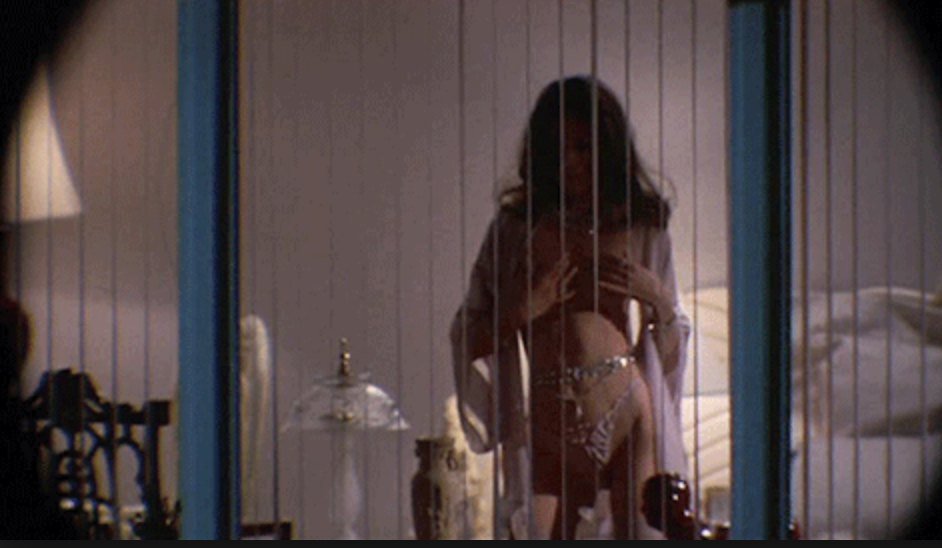Few directors have been able to adequately pay homage to Alfred Hitchcock over the decades since the undisputed master of mystery gave us his last film, Family Plot, in 1976. That is, save for Brian De Palma, who has long been consistent in his overt and unwavering love and respect for the filmography of the only true god of modern cinema as it was intended to be: dramatic, sweeping and aesthetically sumptuous.
As far as the latter term goes, there was no better time than 1984 to make the ultimate use of excess and its according visuals. De Palma does just that from the outset of Body Double (proudly and fittingly declared to be the favorite film of Patrick Bateman), swapping San Francisco for Los Angeles as fake palm trees provide the backdrop for a graveyard as only a Hollywood set would sanction. And that’s just the world that Jake Scully (Craig Wasson) is inhabiting as an actor barely getting by in low-budget affairs.
Unfortunately, the same way Scotty (Jimmy Stewart) in Vertigo has, well, vertigo, Jake has his own crippling foible when it comes to being in any way useful in a crisis: claustrophobia. A feeling of panic and immobility that sweeps over him whenever he’s in a space that reminds him of an unpleasant childhood memory. And it’s a memory that his acting teacher forces him to tap into during a class in which a fellow struggling actor by the name of Sam Bouchard (Gregg Henry) happens to catch the “performance,” one that he bills as more of a “mind-fuck” than an “acting exercise,” finally interjecting after Jake seems on the verge of a nervous breakdown.
As the two grab a drink after ditching the class, it becomes conveniently revealed that while Jake needs a sublet after catching his girlfriend cheating on him, Sam just so happens to have a friend’s place to offer while he takes a gig in Seattle. It’s all very deliberately hooey in well-timed convenience, with Sam also “just happening” to point out to Jake that there’s a woman across the way that puts on the same “show” every night like clockwork. And yeah, there’s a telescope to watch her through as she does her sultry nude dance to no one in particular. The Peeping Tom in Jake is immediately invoked, and he becomes transfixed by Gloria Revelle (Deborah Shelton), a trophy wife to an abusive husband, he soon learns. Even though Jake has just been fired from the movie as a result of his inability to act during the claustrophobic graveyard scene, he seems to care about little else other than Gloria, especially after he notices an ominous “Indian” (it was the 80s, and Native American wasn’t yet being used pervasively) also watching her from outside. Her desperation for non-violent attention, Jake soon learns, has translated into an affair that becomes known to him after he overhears her conversation on a payphone at a shopping mall–a milieu Hitchcock surely would have relished making use of had he made it to the 1980s.
Seeing the malicious presence of the Indian man trailing her just as Jake is, our “sex offender” (as the lead detective on the case eventually calls him) hero finds himself paralyzed two times in his attempt to protect Gloria (who knew claustrophobic spaces could be so common in L.A., a city mostly known for being too spread out?), fated to endure a very iconic and memorable end. It is at this point in the film that the Vertigo-style bifurcation occurs, with Jake himself taking on a new persona as a greaseball porno producer in order to get to the bottom of why adult film star Holly Body (Melanie Griffith) seems to possess the exact same moves that Gloria riveted him with from his vantage point within the perch of a borrowed house (the Rear Window angle, if you will). That it happens to take his acting abilities to unforeseen places is an inconsequential side effect–he’ll do anything to figure out the unsolved conundrum of how he could be seeing those exact same seductive sways from two different women.
Where Hitchcock is of course known for more parsimonious dialogue, relying heavily on the mastery of his visuals to convey emotion or plot progression, De Palma puts his own unique stamp on the Hitchcock method with exchanges that only De Palma could get away with (e.g. “Hello Gloria? Maybe you remember me. This is Jake. I’m the guy that almost fucked you at the beach today”).
The film is itself intended to be a body double of the two greatest masterworks from Hitchcock’s oeuvre, unapologetic in blatantly ripping off the plots and plot devices of both. Perhaps more literal remake than mere homage, De Palma does seem to delight in inhabiting the skin of Hitchcock just as Holly Body seems to the skin of Gloria Revelle. But the thing about being an uncredited replica of someone else is, the “true original” always gets the glory. And for a while, that applied to Body Double, universally panned as filth and trash. With the generosity of time, however, Body Double has become very much its own movie, with a reverent and devoted cult following–only further vindicated in the recent Noah Baumbach/Jacob Paltrow-directed documentary, De Palma. And yes, to the voyeur in all of us (for we have all been rendered such whether we want to be or not thanks to des médias sociaux), Body Double assures you that you aren’t the only freaky deaky.





















